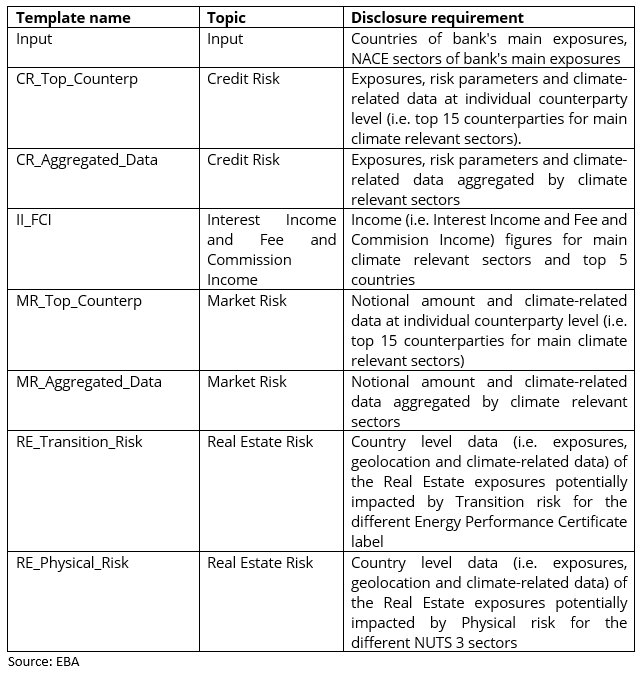The European Banking Authority publishes Final Templates on the One-off Fit-for-55 Climate Risk Scenario Analysis
On 17 November 2023, the European Banking Authority (EBA) published the final templates that will be used to collect climate-related data from EU banks in the context of the one-off Fit-for-55 climate risk scenario analysis.
The One-off Fit-for-55 climate risk scenario analysis is part of EBA’s Climate Stress Testing task. Its purpose is to assess the resilience of the EU banking system to the potential impact of climate risks, in line with the European Commission mandate in the scope of its Renewed Sustainable Finance Strategy.
110 EU Banks to Report Aggregated and Counterparty-Level Data from December 2023
The One-off Fit-for-55 climate risk scenario analysis exercise templates published by the EBA are designed to perform a data collection among 110 EU banks and gather climate-related and financial information on credit risk, market and real estate risks.
Banks are asked to report aggregated and counterparty level data as of December 2022. The data collection will start from on 1 December 2023 and will be completed on 12 March 2024. The EBA will collect the data on several submission dates and will also carry out data quality checks over the data submitted.
General Overview of the One-off Fit-for-55 Climate Risk Scenario Analysis Exercise Templates
The One-off Fit-for-55 climate risk scenario analysis exercise templates include eight templates with the following disclosure requirements for banks:

ALL except the “Input” template are regarded calculation support and validation data (CSV) templates and contain calculations in some areas.
The Input and CSV templates are supplemented with an additional “Instructions” section that provides general information on how to fill in the templates, along with some general information (i.e., the version number of the file).
Furthermore, the Excel file with the Input and CSV templates and Instructions are accompanied by a Template Guidance document containing detailed explanations on how to use the templates.
ENERGY PERFORMANCE CERTIFICATE DATA AS INDICATOR OF REAL ESTATE TRANSITION RISK
In particular, and of most relevance to European DataWarehouse in its role as project coordinator of the EU-funded ENGAGE for ESG initiative, the One-off Fit-for-55 climate risk scenario analysis exercise templates include two specific templates on Real Estate Risk:
- A template on Real Estate Transition Risk, under which banks are required to report commercial and residential real estate exposures falling within the scope of the Energy Performance Certificate (EPC) regulations, for the top EU 5 countries, by asset class (i.e., RRE and CRE) and by EPC bucket. The aggregation by country should be done according to the country of the collateral and the top 5 countries should be identified in terms of total exposure to commercial and residential real estate obligors.
- A template on Real Estate Physical Risk, under which banks are required to report commercial and residential real estate exposures for the top 5 EU countries, by asset class (i.e., RRE and CRE) and by NUTS 3 code. The aggregation by country should be done according to the country of the collateral and the top 5 countries should be identified in terms of total gross carrying amount to commercial and residential real estate obligors.
The ENGAGE for ESG initiative aims to contribute to the goals of the EU Green Deal, namely, to the activation of sustainable investments in the building sector by promoting ESG transparency for residential mortgages and home renovation loans.
EDW is collaborating on the ENGAGE for ESG initiative towards the development of the ‘ENGAGE Templates’, currently focused on aligning mortgage and home renovation loan disclosures with the EU Taxonomy Regulation requirements.
In the future, the ENGAGE Consortium plans to incorporate a dedicated building block for the disclosure requirements applicable under the EBA and European Central Bank stress tests in its ENGAGE Templates. The first ENGAGE Template versions are now accessible to European lending institutions who wish to become familiar with the standards proposed by the ENGAGE for ESG initiative.